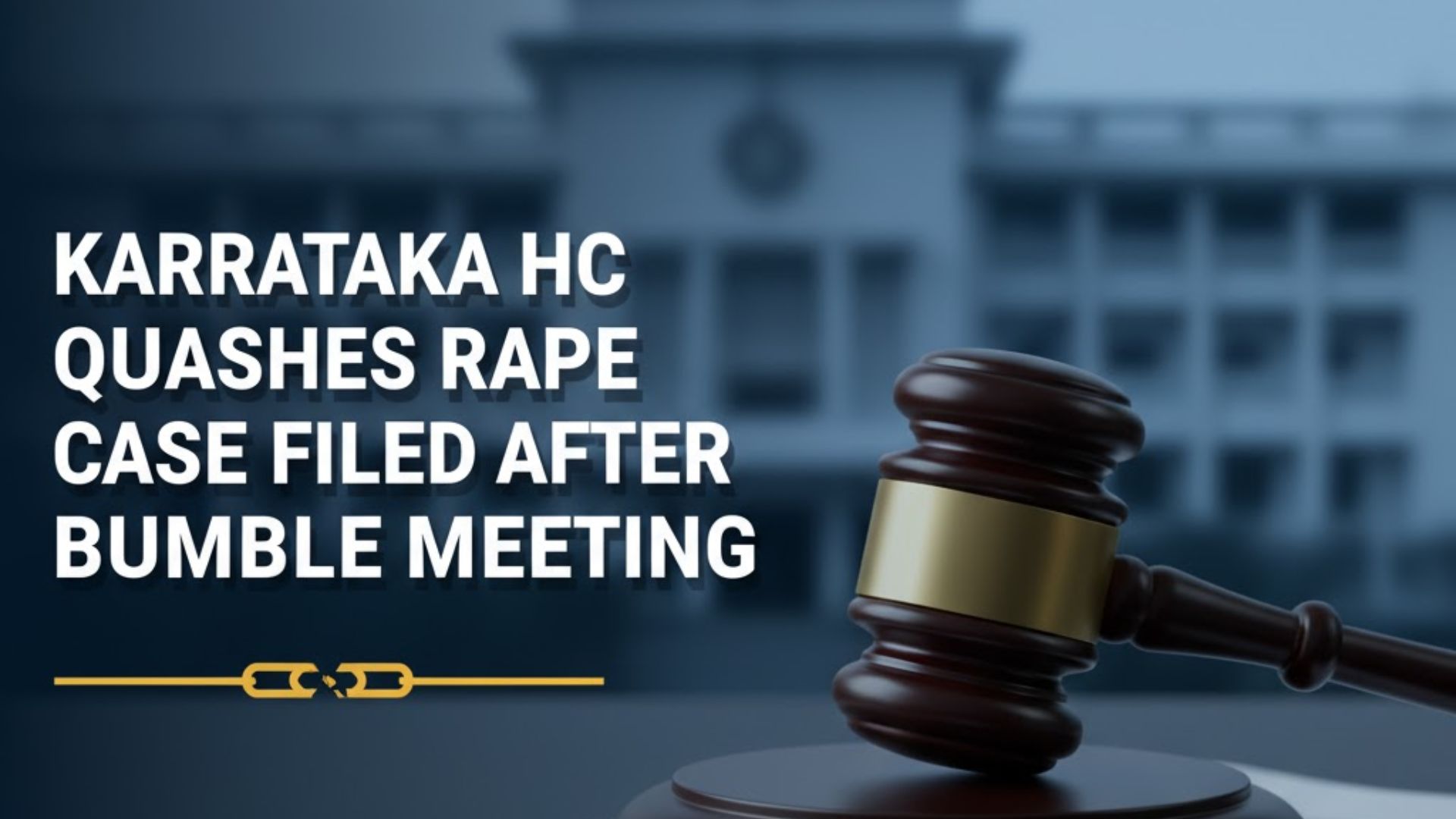
Karnataka High Court Quashes Rape Case Filed After Bumble Date
Court says consensual relationship cannot be criminalised
Order highlights importance of consent and digital evidence in modern relationships
By Our Legal Reporter
New Delhi: October 28, 2025: In a significant ruling, the Karnataka High Court has quashed a rape case filed against a 23-year-old man by a woman he met on the dating app Bumble. The case, which drew attention for its connection to online dating and questions of consent, was dismissed by Justice M Nagaprasanna on October 25, 2025. The court held that the relationship between the two was consensual and that the evidence, including private chats, did not support the allegation of rape.
This judgment has sparked discussions on how courts interpret consent, digital communication, and modern dating culture in India.
Background of the Case
- The man and woman met on Bumble about a year before the incident.
- They stayed in touch through Instagram chats and messages.
- On August 11, 2024, they met in person, had a meal together, and later went to a hotel.
- The woman later alleged that she had withdrawn her consent during intimacy, but the man continued.
- She filed a complaint under Section 64 of the Bharatiya Nyaya Sanhita (BNS), which deals with rape.
The accused argued that the relationship was consensual and that the police had ignored digital evidence—including chats that showed mutual willingness.
Court’s Observations
Justice Nagaprasanna made several important points in his ruling:
- Consensual Relationship: The court said that a relationship “born of mutual volition” cannot be criminalised simply because it later ends in disappointment.
- Chats as Evidence: The judge noted that the chats between the two, though “not in good taste,” clearly showed that the intimacy was consensual.
- Limits of Criminal Law: The court stressed that criminal law should not be misused to settle personal disputes arising from failed relationships.
- Consent and Withdrawal: While the complainant claimed she withdrew consent, the court found no strong evidence to prove that the accused ignored it.
Wider Legal Context
This ruling adds to a growing body of judgments where courts have had to carefully examine consent in intimate relationships.
- In past cases, courts have ruled that false promises of marriage can amount to rape if consent was obtained under deception.
- However, in this case, the court found no such deception—only a consensual relationship that later soured.
- The judgment also highlights the role of digital evidence (messages, chats, social media interactions) in modern legal disputes.
Social and Legal Implications
- For Online Dating: With apps like Bumble, Tinder, and Hinge becoming popular, this case shows how courts are adapting to new forms of relationships.
- For Consent Laws: The ruling reinforces that consent must be clear and provable, and that criminal law cannot be applied to every failed relationship.
- For Women’s Rights: While some may see this as a setback, others argue it prevents misuse of rape laws in cases where relationships were consensual.
- For Men’s Rights: The case is being cited by men’s rights groups as an example of how false or weak allegations can harm reputations and lives.
Reactions to the Judgment
- Legal Experts: Many lawyers have welcomed the ruling, saying it prevents the criminalisation of consensual intimacy.
- Women’s Rights Activists: Some activists have expressed concern, warning that it may discourage genuine victims from coming forward.
- Public Debate: On social media, the case has sparked debates about consent, dating culture, and misuse of rape laws.
Conclusion
The Karnataka High Court’s decision to quash the rape case against the 23-year-old man is a landmark ruling in the context of modern relationships and digital dating. It underscores the importance of mutual consent, responsible use of criminal law, and the role of digital evidence in today’s world.
As India continues to grapple with evolving social norms, this case will likely serve as a reference point for future legal battles involving consent and online dating.
ALSO READ POPULAR ARTICLES
-
Supreme Court Opens Door for Vodafone Idea Relief in AGR Case
-
Delhi High Court Rules No Alimony for Financially Independent Spouse
-
Akshay Kumar Moves NCLAT Against Edtech Firm Over ₹4.83 Cr Dispute
-
SC Quashes Chhattisgarh Tender Clause Favoring Local Bidders
-
SC to Examine Validity of Securities Transaction Tax on Trading
-
SC Defers Vodafone Idea ₹5,606 Crore AGR Dues Hearing to Oct 13
-
Punjab & Haryana HC: Bail Can’t Be Cancelled for Seeking Hearing Exemptions
-
Delhi HC Protects Mankind Pharma’s ‘Kind’ Trademark, Bars Similar Names
-
Delhi HC Appoints Justice Rajiv Shakdher as Arbitrator in Playboy Bar Dispute
-
Karisma Kapoor’s Kids Challenge Sunjay Kapur’s Will in Delhi HC
-
SC Questions Dual Madras HC Hearings, Reserves Verdict on TVK Plea
-
SC Lets Judicial Officers With 7 Years Bar Apply for District Judge
-
SC to Hear Vijay’s TVK Plea Against SIT Probe in Karur Stampede
-
SC Probes Financial Irregularities in Indiabulls Housing: ED
-
Delhi HC Quashes 22-Year-Old Case Against Lawyer Over Basement Office
-
SC Seeks Rehab Plan for Cadets Injured During Military Training
-
SC PIL Seeks CBI Probe, Nationwide Review on Cough Syrup Deaths
-
Delhi HC Hikes Land Compensation for Yamuna Project Villagers
-
Punjab & Haryana HC: Bail Can’t Be Denied Over No Permanent Home
-
SC: Appellate Courts Can Correct Trial Court Evidence Errors